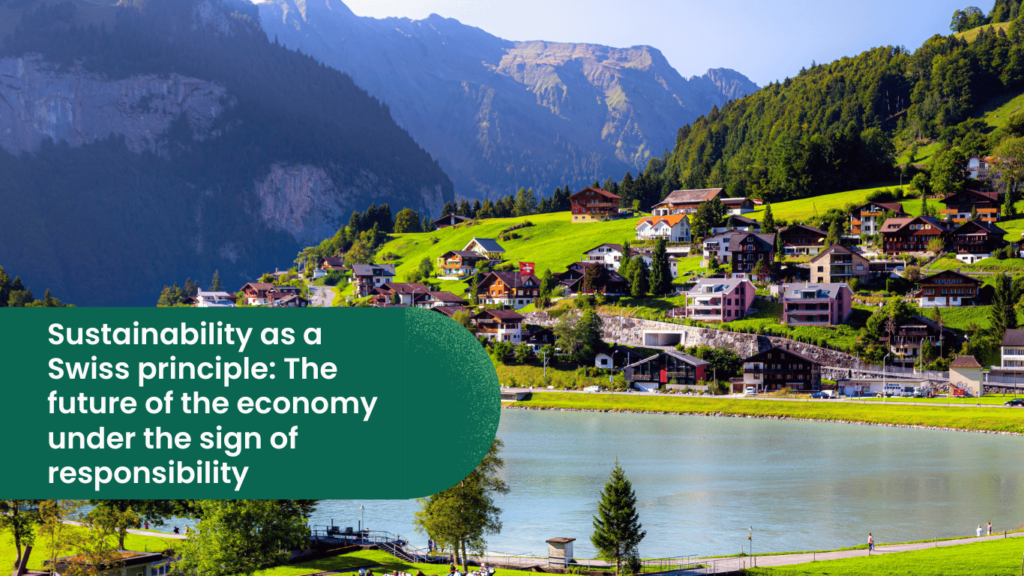Switzerland, known for its picturesque landscapes and its precision in technology and innovation, is on the threshold of a new era of business. Under the banner of sustainability, the country is committed to playing a pioneering role in the global movement for a better future. As part of the 2030 Agenda for Sustainable Development, Switzerland has made clear its ambition to achieve the 17 Sustainable Development Goals (SDGs), an endeavor that requires a coordinated effort across all levels of society.
Since 2015, the Swiss Agency for Development and Cooperation (SDC) and the Federal Office for Spatial Development have been coordinating an interdepartmental process that encompasses the entire federal administration, cantons, cities, municipalities and non-state actors. Initiatives such as the „Dialogue 2030 for Sustainable Development“ platform and the „2030 Agenda Advisory Group“ are examples of the inclusive approach with which Switzerland involves various social groups in the sustainability debate.
Despite considerable progress in various areas such as combating natural hazards and promoting social cohesion, Switzerland faces significant challenges. The Bertelsmann Foundation’s „SDG Index and Dashboards Report 2017“ ranks the country 8th out of 157 countries, a testament to its commitment, but also an indication of the road ahead. Significant progress is still needed, particularly in the areas of poverty reduction, gender equality, sustainable consumption and production models and climate protection.
Strategies for a sustainable economy
The transformation towards a sustainable economic system requires fundamental changes in the way companies operate. The central pillars of this transformation are the circular economy, resource efficiency, climate protection and social responsibility.
The circular economy is the order of the day, calling for a rethink from linear to cyclical production and consumption patterns. Companies are required to design products and services that are durable, repairable and fully recyclable at the end of their life cycle.
Resource efficiency plays a crucial role on the road to a more sustainable economy. The economical use of energy, water and raw materials must be anchored in the core strategies of companies.
In the fight against climate change, it is essential that companies minimize their CO₂ emissions and invest in technologies that accelerate the transition to a low-carbon economy.
The social responsibility of companies extends to the well-being of their employees and wider society. Fair working conditions, equal opportunities and health protection are not only ethical imperatives, but also cornerstones of long-term corporate success.
ESG opportunities: A guide for companies
The integration of environmental, social and governance (ESG) criteria into corporate management is more than just a trend – it is a necessity for sustainable business models. Transparent sustainability reporting based on internationally recognized standards and a proactive stakeholder dialogue are key elements in strengthening the trust of customers, investors and the public.
Advantages and challenges of sustainable management
Companies that are committed to sustainability enjoy numerous benefits. An improved image, increased competitiveness and the minimization of risks are just some of the positive effects. However, the path is not free of hurdles. High investment costs, the complexity of ESG integration and, in some cases, a lack of incentives are challenges that companies have to face.
Pioneer of sustainability in the Swiss economy
When it comes to sustainability and ecological responsibility, the Swiss company MABEWO stands out for its commitment to environmentally friendly innovation and sustainable business practices. As a certified member of the Sustainable Switzerland Entrepreneurs Club and with official ESG accreditation, MABEWO not only represents an enhanced corporate image and increased competitiveness, but also boldly faces the challenges that come with high investment costs and the complexity of ESG integration.
MABEWO’s success story is based on the development of high-tech solutions that enable resource-efficient production of food, feed and energy, thus significantly minimizing the ecological footprint. With a visionary view of the future of agriculture and energy production, especially in view of global challenges such as climate change and urbanization, MABEWO focuses on Controlled Environment Agriculture to optimize plant growth under controlled conditions and thus ensure a safe, local and environmentally friendly food supply.
The innovative combination of food and energy production that MABEWO is realizing through the introduction of Agri-Racks underlines the company’s ambition to promote sustainable methods while bringing traditional agriculture into the digital age. This approach not only reduces CO₂ emissions by promoting local production, but also helps to position agriculture as an attractive and future-oriented career field.
MABEWO’s commitment to sustainability reflects Switzerland’s holistic approach, which aims to play a leading role in the global sustainability movement.
Global sustainability strategies – working together for a healthy environment
Switzerland is not alone in its commitment to sustainability, but its holistic approach and the involvement of various social actors are setting standards. Implementing the 2030 Agenda is a dynamic process that requires flexibility and innovation. Companies that rise to these challenges and place sustainability at the heart of their actions will not only contribute to solving global problems, but will also prosper in the long term.
Switzerland’s vision is to play a leading role in the global sustainability movement. This requires continuous commitment, creative solutions and a willingness to question and rethink existing business models. The 2030 Agenda provides a framework within which Switzerland and its economy can reinvent themselves – for a just, liveable and sustainable future for all.
Responsible according to the press laws
Dr. Rainer Schreiber, Lecturer, adult education & personnel consultant
About Dr. Rainer Schreiber: The blog schreiber-bildung.de covers topics relating to education, further training and career opportunities. His interests lie in adult vocational training and he publishes on the topics of personnel consulting, demographic change and economic policy.
Contact: MABEWO, Chli Ebnet 3, CH-6403 Küssnacht/Rigi, Switzerland
T +41 41 817 72 00
info@mabewo.com
Represented by Mr. Jörg Trübl
MABEWO stands for sustainability. „Make a better world“ invests in the future and develops innovative technologies to solve the greatest challenges of our time: Climate protection, energy transition, resource conservation and food supply. Mr. Jörg Trübl is a trained environmental engineer and has over 20 years of practical business experience in corporate management as a consultant, coach and CEO of SMEs in Europe. Further information can be found at: https://www.mabewo.com/
Press contact:
MABEWO AG, Max Fischer, Chli Ebnet 3, CH-6403 Küssnacht/Rigi, Switzerland
T +41 41 817 72 00
presse@mabewo.com





